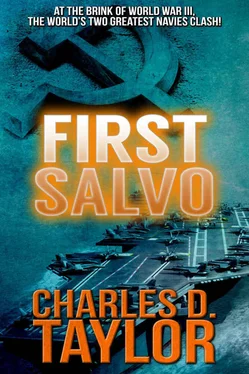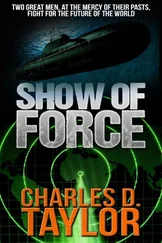As he traveled, sometimes changing his pace to a trot, he reviewed the time that had passed since landing on Spitzbergen. He decided it had to be mid to late afternoon, and that he had anywhere from eight to ten hours left before the others were picked up by the Norwegian boat.
An inlet lay ahead that cut into a narrow valley. Ryng wanted desperately to get away from the narrow beachhead he was now covering. Its 150-yard width offered very little protection, a thought that kept him looking over his shoulder in the direction of Longyearbyen every minute or so. His chart showed a stream, a real one this time, that coursed out of the mountains to this inlet. It appeared narrow and deeper than the glacial runoff that had almost trapped him.
It was a few miles from the spot where the last helo had passed over him. There was no mud or silt to form a plain in this one, or at least it was hemmed in by the natural gully of the stream. Ryng fell to his knees, cupping the water and sipping slowly from his hands. Not too fast — his stomach was empty. Then he bent farther over and splashed the water over his face, onto his head, and down his neck. He could feel the caked mass in his hair breaking up under the makeshift bath and thanked whatever had saved him for also being sure that nobody saw him looking like that. The water was cold, but the exertion had warmed his body to the point that his earlier chill was gone. Ryng knew that if it had been a few weeks later, or one more of those arctic storms had come over the island, that his odds of getting away would have been very slim indeed.
After sipping some more of the water, he extracted the chart from his shirt. It was as accurate as Naval Intelligence could make it. As soon as the Norwegians had reported strange happenings in their territory, intelligence satellites had been repositioned to photograph the entire island. Highly specialized cartographers had then compared the photos to the latest charts in stock. It was a necessary exercise because they could detect annual changes in a particular area — in this case, the terminus of glaciers and the places where a man could and could not pass freely.
The stream he now sat by would be of no use. It worked quickly back into the mountains in a series of sharp falls. And at this point, the coast of the harbor narrowed even more than its current 150 yards. The cliffs facing across toward the Soviet base became sheer — impossible to climb.
He would have to cross the stream a few hundred yards up, then turn into the higher country. While the cliffs facing the harbor were impossible, their reverse side was much gentler, sloping into a series of glacier-scooped hanging valleys. Water runoff from the receding glaciers allowed some vegetation that would provide cover from time to time. Ryng could make it almost in a straight shot, except for the last peak, which was part of a westward-facing range — toward the ocean and safety. That one was steeper and would involve climbing in snow on one side and likely a long slide down the other, for he would briefly find himself crossing year-round snowfields.
As he slipped the chart inside his shirt, a growling in his stomach reminded him how empty it was. There was little chance of finding anything to eat. Svalbard was so far north, merely a thousand miles or so from the North Pole, that only a few species of animal life could survive here. Although polar bears, reindeer, and sea birds seemed to thrive in the harsh climate, Ryng had nothing that could kill one. Better to forget the hunger and concentrate on getting the hell out as fast as possible , Ryng realized. If he didn’t get to the meeting place in time, he could plan on a most unpleasant stay.
For the next half hour, he climbed a slope toward the first valley. The climb was gentle at first and then steeper as he came near the lip. Once over the top, there was another gentle slope where he could again pick up his pace without tiring himself. There were no trees, nothing that might provide a hiding place when they came back searching for him — which was another aspect to worry about. There was no longer the early warning of the helo coming across the broad harbor. The peaks would blot out the sound, and he would know nothing about them until a helo cleared a peak and came down toward him. They had the advantage this time.
As he progressed, he planned each few hundred yards, determining where he would duck if he suddenly heard the telltale sound of that engine. Unless they were lucky, they wouldn’t spot him instantly. There would be time, however short, to run for cover — unless he was directly in their line of sight as they came over the top.
The terrain varied between the hard surface of gravel and dirt and the softness of ground cover that Ryng decided must be tundra. He had never been in such a place before and his knowledge of what the terrain might be was limited to what he had read in books and training manuals. The land provided a cushion in spots, giving slightly as he moved along. It was almost like walking on a mattress.
What he wasn’t prepared for, however, was the water underneath the vegetation. Quite unexpectedly, his foot sank through. Water squished icily around his feet, the ground shaking like jelly. Each step became more difficult, forcing him to head toward a side where the gravelly, hard surface could be seen again. But as he moved toward the solid ground, he found that he was also crossing a more dangerous area. Now his feet broke through with each step, sometimes sinking halfway up his shin before he could pull out of it. He had read about the tundra before and how during the warm weather it could melt down for a few feet. It would become almost impassable at that point. Now Ryng knew exactly why.
And as he struggled for the edge, he heard the ominous sound of rotors again. Looking up to his left, he saw a helo just clearing the ridge above him. As the fuselage came into view outlined against the clear sky he could see the rockets on either side, the machine gun pods suspended farther out. If it kept on the same course, it would pass right in front of him. Should he simply throw himself face down in the quaking tundra, lying out in the open, hoping not to be seen yet realizing what a simple target he provided? Or should he try to run for it, stumbling across the remainder of the bog, trying to get to the shelter of a boulder at the edge?
He decided to run. Struggling against the suction of the bog, adrenaline coursed through his system. He somehow knew that if the helo turned at all in his direction, he would have to dive forward, hoping the unfriendly tundra would somehow cover him, close over him until the helo passed over.
It was like a goddamn dream. No matter where you go , Ryng thought, something always chases you, and no matter how fast you try to move, something drags at your feet so you can’t get away fast enough . It didn’t make any difference to Ryng whether it was thick, oozing silt or a bog in a hidden valley. The result was the same. He couldn’t move fast enough and there was a helicopter searching for him and the people in it wanted him dead and they had more than enough in the way of weapons to make him dead. The thought passed through his mind again that all their commander needed was a body, or even a piece of a body , as evidence, and that made him frantic enough to push beyond normal bodily limits.
The helo remained on the same course long enough for him to make a last desperate plunge out of the bog. He slid nose first behind the boulder, which was large enough to conceal him. If the helo came toward him, he could huddle close enough and crawl around the rock if the craft came down to circle and inspect.
And that’s finally what it did. It came down low enough so that Ryng wasn’t sure whether they saw the prints he’d made or not. Unfortunately, this time there was no colored water to cover his path. In his anxiety to escape the cloying vegetation, he had torn it. Tufts of roots and gnarled vegetation stuck out in every direction. From his vantage point, it was like a well-marked trail. The helo slowed, and perhaps the occupants did see that the ground cover had been disturbed by something. They hovered for a moment, then slowly came over by the boulder, passing on the opposite side, then swinging out and heading back on the side where Ryng had been cowering. Snakelike, he crawled around the base, always placing it between himself and the eyes in the helo.
Читать дальше












